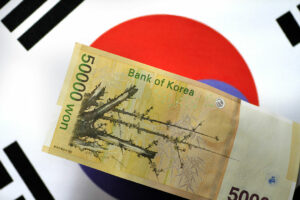
Senate likely to ratify FTA with S. Korea in January
By John Victor D. Ordoñez, Reporter
THE PHILIPPINE Senate will likely ratify the free trade agreement (FTA) with South Korea when Congress resumes session in January, according to the Senate president.
“We go on Christmas break, so we are surely ratifying the FTA with South Korea when we get back in January,” Senate President Juan Miguel F. Zubiri told BusinessWorld in a Viber message.
Congress is scheduled to adjourn session on Dec. 16. Session will resume on Jan. 22, 2024.
Under the Constitution, international agreements and treaties require a concurrence of two-thirds of the Senate’s members for ratification.
The Philippines and South Korea signed the free trade deal last September, as both countries seek to strengthen economic ties.
Last week, South Korea’s Ambassador to the Philippines Lee Sang-hwa said he expects South Korea’s parliament to ratify the agreement “soon.”
“With this win-win agreement, our two countries’ trade and investment are set to increase in the coming years. In this context, Korea strongly supports the Philippine government’s efforts to improve its ease of doing business environment,” Mr. Lee said during a lunch with Philippine media on Dec. 7.
Under the free trade deal, South Korea will remove tariffs on about 94.8% of Philippine products, while the Philippines will remove tariffs on 96.5% of South Korean goods.
Calixto V. Chikiamco, Foundation for Economic Freedom (FEF) president, said the deal would allow the Philippines to expand market access for its agricultural products.
“The FTA will strengthen, enhance, and enrich the already strong cultural and economic ties between South Korea and the Philippines by further promoting trade through the deep reduction in tariffs and fostering technical and cultural cooperation through the technical cooperation of the agreement,” he said in a Viber message.
For the FTA, the Philippines was able to secure tariff elimination on 1,531 lines of agricultural goods, of which 1,417 lines will be removed upon entry into force (EIF) of the bilateral FTA.
The Philippines is aiming to export more bananas, processed pineapples and other fruits to South Korea.
Tariffs on bananas, which are currently charged a 30% tariff, are set to go to zero over five years. Tariffs on processed pineapples, which are currently charged 36%, will be removed in seven years.
Rizal Commercial Banking Corp. Chief Economist Michael L. Ricafort said the FTA would attract more foreign direct investments from South Korean companies.
“They (Korean firms) would benefit from a wider export market that would lead to more sales at significantly reduced tariffs that would lower production costs,” he said in a Viber message.
For industrial goods, the FTA led to tariff elimination for 9,909 lines, of which 9,747 lines are set for tariff elimination upon EIF.
South Korea seeks to expand its automakers’ presence in the Philippines as tariffs for automotive units and components will be eliminated under the FTA. Under the deal, the 5% import duties on South Korean cars will be lifted immediately once the FTA comes into effect. Duties on electric and hybrid vehicles from South Korea will be eliminated within five years.
Last year, South Korea was the country’s fourth-biggest trade partner with total trade valued at $15.54 billion.
South Korea was the Philippines’ seventh-biggest export trading partner with $3.13 billion and its fourth biggest supplier of imported goods valued at $12.32 billion.
The Department of Trade and Industry said last week that it will work with the Korea Institute for Advancement of Technology to develop an FTA utilization tracker that would monitor the implementation of trade agreements.
President Ferdinand R. Marcos, Jr. in September said the trade pact is a “milestone for economic friendship” between the two countries and would contribute to the Philippines’ “value proposition as an ideal regional hub for smart and sustainable investments.”
The Philippines is also seeking an FTA with the European Union, which Trade Secretary Alfredo E. Pascual earlier said is in a “scoping stage” that is expected to be finished by the end of the year.



